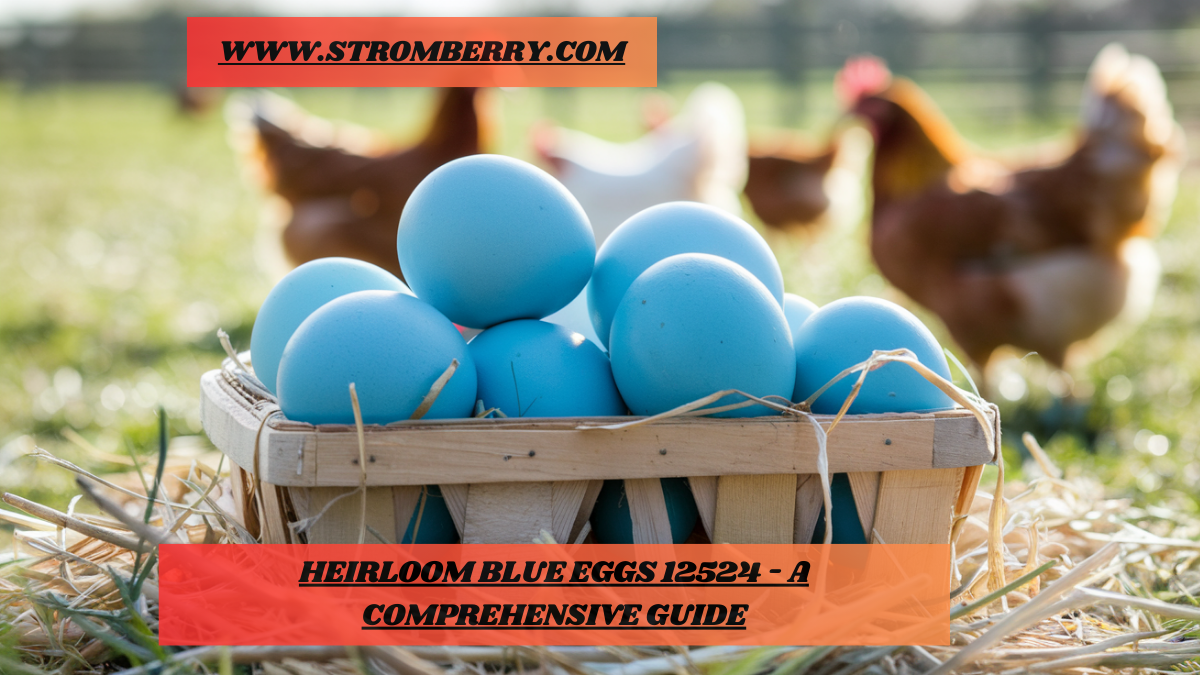Introduction to Heirloom Blue Eggs
If you’re searching for unique and beautiful eggs with a rich history, then heirloom blue eggs 12524 should be on your radar. Unlike regular white or brown eggs, these eggs boast a natural blue shell color that is both eye-catching and meaningful in terms of breed heritage. These eggs are laid by specific breeds of chickens, including Araucana, Ameraucana, and Cream Legbar, which are prized for their vibrant blue eggs.
Heirloom blue eggs 12524 come from heritage chicken breeds like the Araucana, Ameraucana, and Cream Legbar, offering unique, nutrient-rich eggs with vibrant blue shells, prized for their quality.
This article will take you through everything you need to know about heirloom blue eggs, focusing on why they’re special, how they are raised, and the benefits they offer over regular eggs.
What Are Heirloom Blue Eggs 12524?
Heirloom blue eggs 12524 are eggs produced by heritage chicken breeds, with vibrant blue shells that distinguish them from other eggs. The unique blue color comes from a pigment called biliverdin, which is deposited onto the eggshell as it is formed. These eggs are valued not only for their color but also for their high nutritional content and exceptional taste.
Key Chicken Breeds That Lay Blue Eggs
- Araucana: A South American breed known for its blue eggs and tailless appearance.
- Ameraucana: Originating from the Araucana, this breed also lays blue eggs but comes with a beard and muffs, making them quite distinct.
- Cream Legbar: A British breed that is recognized for laying stunning sky-blue eggs and its auto-sexing characteristic, which allows for gender determination at hatch.
The Appeal of Heirloom Blue Eggs
For many, heirloom blue eggs 12524 go beyond their beautiful shells. These eggs carry an air of exclusivity due to the specific heritage breeds that lay them. Their farming practices often emphasize quality, care, and sustainability. Whether you’re a farmer, a gourmet chef, or simply an egg lover, these heirloom eggs offer a culinary experience that’s not found in supermarket aisles.
Unique Characteristics of Heirloom Blue Eggs:
- Color Variety: The rich blue shades, ranging from pale robin’s egg blue to deep aqua.
- Breed-Specific Production: Blue eggs come only from particular chicken breeds, emphasizing the rare and heritage nature.
- Farm-to-Table Freshness: Many heirloom eggs come from small, local farms using free-range or organic methods.
- Nutritional Value: Higher in omega-3 fatty acids, vitamins, and healthier fats compared to commercially produced eggs.
The History and Heritage Behind Heirloom Blue Eggs 12524
The history of heirloom blue eggs 12524 can be traced back to South America, particularly to the Araucana chickens found in Chile. These chickens were native to the Mapuche region and have been documented for centuries. Their beautiful blue eggs caught the attention of farmers and breeders worldwide, and soon enough, the popularity of these chickens spread.
Other breeds like Ameraucana and Cream Legbar were later developed to capitalize on the blue-egg-laying genes, creating even more diversity in appearance and production rates. Today, these eggs represent a connection to traditional farming practices and breed preservation.
Why Choose Heirloom Blue Eggs?
1. Aesthetics
One of the primary reasons people are drawn to heirloom blue eggs is their striking appearance. These eggs can add a pop of color to your kitchen and your plate, making them a favorite for chefs who want to present visually stunning dishes.
2. Nutritional Superiority
Heirloom eggs tend to come from chickens raised in environments that allow them to forage for natural food, like bugs and greens. This diet results in eggs that are richer in essential nutrients:
- Higher Omega-3s: Known for supporting heart health and reducing inflammation.
- Vitamins: Rich in vitamins A, D, and E.
- Healthier Fat Profile: A more favorable balance of fats compared to industrial eggs.
3. Taste Difference
Due to the better diet and care, many believe that heirloom blue eggs 12524 have a more flavorful, richer taste compared to regular eggs. Their yolks are often a vibrant orange color, indicating a high level of freshness and nutrition.
4. Ethical Farming
If you are concerned about animal welfare, heirloom eggs are usually produced under more humane conditions. The chickens are often free-range, meaning they have access to the outdoors and are able to live in more natural conditions, resulting in healthier chickens and better-quality eggs.
Farming Practices Behind Heirloom Blue Eggs
Free-Range and Organic Farming
Heirloom blue eggs often come from chickens raised on small farms that emphasize organic, free-range practices. Chickens are allowed to forage and roam, which contributes to both the well-being of the chicken and the quality of the eggs they produce. Some farms even specialize in regenerative agriculture, meaning that the way they farm helps improve the health of the soil and the ecosystem overall.
Sustainability and Preservation of Heritage Breeds
The preservation of heritage breeds is essential for biodiversity. Many heritage chicken breeds, like the ones that lay heirloom blue eggs, are in danger of becoming extinct due to the industrialization of farming. By choosing heirloom blue eggs, you are supporting efforts to maintain these genetic lines and promoting a healthier, more sustainable farming system.
How to Raise Chickens for Heirloom Blue Eggs 12524
If you’re interested in raising your own chickens to produce heirloom blue eggs, here are a few tips to get started:
- Choose the Right Breed: Focus on breeds like Araucana, Ameraucana, or Cream Legbar if you want blue eggs.
- Provide a Proper Environment: Make sure your chickens have enough space to roam and forage, as this will ensure they produce high-quality eggs.
- Nutritious Feed: Supplement their foraging diet with nutritious chicken feed that supports their health and egg production.
- Clean and Safe Coop: Keeping a clean environment is essential for preventing disease and ensuring your chickens are comfortable.
Where to Buy Heirloom Blue Eggs 12524?
Looking for heirloom blue eggs 12524? Depending on where you live, these eggs may be available at local farmers’ markets, organic food stores, or even directly from small farms. Many online retailers also offer heritage eggs, which can be shipped fresh to your door. Always make sure to verify the farming practices to ensure you’re getting authentic, high-quality heirloom blue eggs.
Frequently Asked Questions About Heirloom Blue Eggs 12524
What makes heirloom blue eggs different from regular eggs?
Heirloom blue eggs come from specific heritage breeds, and their color, nutritional value, and taste differ significantly from regular white or brown eggs. They are often produced by free-range or organic farms, making them a more ethical choice.
Are heirloom blue eggs more nutritious?
Yes, heirloom blue eggs often have higher levels of omega-3 fatty acids, vitamins, and healthier fats compared to conventional eggs. Their rich yolks are a sign of better nutrition.
Can you buy heirloom blue eggs in regular supermarkets?
Heirloom blue eggs are typically available at specialty food stores, farmer’s markets, or directly from small, local farms. They are not as widely distributed as conventional eggs due to their limited production.
How are heirloom blue eggs produced?
These eggs are produced by heritage breeds like Araucana, Ameraucana, and Cream Legbar. The chickens are usually raised in free-range or organic environments, contributing to the quality of the eggs.
Are blue eggs safe to eat?
Yes, blue eggs are just as safe to eat as any other eggs. The color difference is purely cosmetic and does not affect the safety or taste of the egg.
Conclusion
Heirloom blue eggs 12524 are more than just a colorful addition to your kitchen—they represent a connection to sustainable farming, heritage chicken breeds, and superior nutrition. Whether you’re raising your own chickens or sourcing them from a local farm, these eggs provide both aesthetic appeal and health benefits. So next time you’re shopping for eggs, consider going the heirloom route—you won’t be disappointed.





